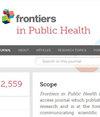Depressive and anxiety symptoms among university students during the later stages of the COVID-19 pandemic in Germany—results from the (C19 GSWS)
IF 3
3区 医学
Q2 PUBLIC, ENVIRONMENTAL & OCCUPATIONAL HEALTH
引用次数: 0
Abstract
IntroductionData on the mental health of university students in Germany during the later stages of the pandemic is still limited. This study aimed to determine (1) the prevalence of anxiety and depressive symptoms among university students 1.5 years after the first COVID-19 restrictions and (2) which factors were associated with these outcomes.MethodsThe cross-sectional COVID-19 German Student Well-being Study (C19 GSWS) collected data of 6,996 students at five German universities. Associations between anxiety and depressive symptoms with sociodemographic and other factors were analyzed using multivariable logistic regression models.ResultsThe mean age of the participants was 23.9 years (SD = 4.8), 67% were female and 31% male. The prevalence for depressive symptoms was 29 and 32% for anxiety. The lack of a trusted person and financial difficulties were associated with anxiety and depressive symptoms. Being worried that someone in one’s personal network had become severely ill with COVID-19 and concern about (re)infection with COVID-19 were associated with anxiety symptoms. Those with pre-existing health conditions had an up to 1.98-times higher chance for reporting depressive symptoms (OR, 95% CI: 1.01–3.88) and an up to 2.27-times higher chance for anxiety symptoms, respectively (OR, 95% CI: 1.15–4.46).ConclusionConcepts for prevention and counseling to tackle mental health problems in students are needed and programs should take specific stressors in times of crises into account.德国 COVID-19 大流行后期大学生的抑郁和焦虑症状--(C19 GSWS)研究结果
导言有关德国大学生在疫情后期心理健康的数据仍然有限。本研究旨在确定:(1) COVID-19 首次限制 1.5 年后大学生焦虑和抑郁症状的发生率;(2) 哪些因素与这些结果相关。方法:COVID-19 德国大学生福祉横断面研究(C19 GSWS)收集了德国五所大学 6996 名学生的数据。结果参与者的平均年龄为 23.9 岁(SD = 4.8),67% 为女性,31% 为男性。抑郁症状发生率为 29%,焦虑症状发生率为 32%。缺乏可信赖的人和经济困难与焦虑和抑郁症状有关。担心个人网络中有人因感染COVID-19而重病以及担心(再次)感染COVID-19与焦虑症状有关。已有健康状况的人出现抑郁症状的几率要高出 1.98 倍(OR,95% CI:1.01-3.88),出现焦虑症状的几率要高出 2.27 倍(OR,95% CI:1.15-4.46)。
本文章由计算机程序翻译,如有差异,请以英文原文为准。
求助全文
约1分钟内获得全文
求助全文
来源期刊

Frontiers in Public Health
Medicine-Public Health, Environmental and Occupational Health
CiteScore
4.80
自引率
7.70%
发文量
4469
审稿时长
14 weeks
期刊介绍:
Frontiers in Public Health is a multidisciplinary open-access journal which publishes rigorously peer-reviewed research and is at the forefront of disseminating and communicating scientific knowledge and impactful discoveries to researchers, academics, clinicians, policy makers and the public worldwide. The journal aims at overcoming current fragmentation in research and publication, promoting consistency in pursuing relevant scientific themes, and supporting finding dissemination and translation into practice.
Frontiers in Public Health is organized into Specialty Sections that cover different areas of research in the field. Please refer to the author guidelines for details on article types and the submission process.
 求助内容:
求助内容: 应助结果提醒方式:
应助结果提醒方式:


